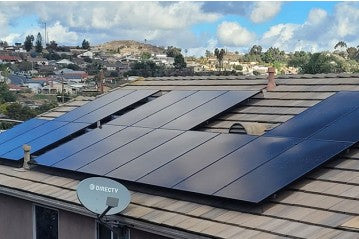
Solar panels have gained significant popularity as a clean and renewable energy source for homes and businesses. They harness the power of the sun to generate electricity, reducing our reliance on traditional energy sources. While solar panels are an excellent investment for sustainable energy, many people wonder if they can use solar panels without battery storage. In this article, we will explore different scenarios where having battery storage with solar panels can be beneficial, as well as situations where sticking with simple rooftop solar panels may be the preferred option.
1. How to Use Solar Panels Directly Without Battery
Solar panels generate electricity whenever sunlight is available, producing direct current (DC) power. This power can be used immediately to meet your energy needs. By connecting the solar panels to an inverter, which converts DC power to alternating current (AC), you can power your home or business directly. Any excess electricity generated by the solar panels can be fed back into the grid, earning you credits or reducing your electricity bill.
Using solar panels directly without a battery is a common practice in grid-tied systems, where the local utility grid acts as a virtual battery. This means that you can draw electricity from the grid when your solar panels aren't generating enough power, such as during nighttime or cloudy days. In such cases, the grid acts as a backup source of electricity.
2. Do I Need A Battery For My Solar System?
Whether or not you need a battery for your solar system depends on various factors, including your energy goals, local utility policies, and your specific energy needs. Let's explore four scenarios where having a battery storage system alongside solar panels can be advantageous:
a. Energy Independence and Backup Power
If you desire energy independence or live in an area with unreliable grid infrastructure, a battery storage system can provide you with backup power during grid outages. With a battery, you can store excess solar energy generated during the day and use it during the night or when there is a power outage. This ensures a constant power supply and peace of mind, even when the grid is down.
b. Time-of-Use Tariffs and Demand Charges
In regions where utilities have time-of-use tariffs or demand charges, having a battery can help reduce your energy costs. You can store excess solar energy during periods of low electricity rates and use it during peak demand times when rates are higher. By avoiding drawing electricity from the grid during peak hours, you can save money on your energy bills.
c. Off-Grid Living
If you live in a remote location with no access to the utility grid, a battery storage system becomes essential. It allows you to store the solar energy you generate during the day and use it as needed, even when the sun is not shining. This self-sufficiency is particularly valuable for off-grid homes, cabins, or recreational vehicles (RVs).
Related: Best Batteries for Off-Grid Solar System: A Complete Guide
d. Environmental Benefits and Energy Resilience
By combining solar panels with battery storage, you can maximize your use of clean, renewable energy. Storing excess solar power in batteries reduces the need for power plants fueled by fossil fuels. Additionally, in areas prone to natural disasters or frequent power outages, a battery storage system can provide energy resilience, ensuring your essential devices continue to function during emergencies.
3. Is It Okay to Use Solar Panels Without Battery Storage?
Yes, it is perfectly okay to use solar panels without battery storage, especially if you live in an area with a reliable grid and have no specific requirements for backup power or energy independence. Utilizing solar panels without a battery still allows you to reduce your reliance on traditional energy sources, decrease your carbon footprint, and potentially save on your electricity bills. In such cases, the excess energy generated by your solar panels can be fed back into the grid, benefitting others and earning you credits.
4. Conclusion
Solar panels are a fantastic investment for sustainable energy generation. Whether or not you choose to use battery storage with your solar panels depends on your individual needs and circumstances. Battery storage systems offer advantages such as backup power during outages, cost savings in certain utility rate structures, off-grid capabilities, and enhanced environmental benefits. However, if you have a reliable grid and do not require these additional benefits, utilizing solar panels directly without a battery can still provide significant advantages, including reduced dependence on fossil fuels and potential energy savings.
Ultimately, the decision to incorporate battery storage with your solar panels should be based on careful consideration of your energy goals, financial situation, and local regulations. Consulting with a reputable solar energy provider will help you determine the best system configuration for your specific needs, ensuring you maximize the benefits of solar power in the most cost-effective manner.
Remember, with or without a battery, solar panels are a step towards a cleaner, more sustainable future, and they have the potential to significantly reduce our carbon footprint while providing a reliable source of electricity for years to come.
ECGSOLAX offers quality solar batteries, inverters and solar controllers, contact us today for more information and a quote!

0 Kommentare